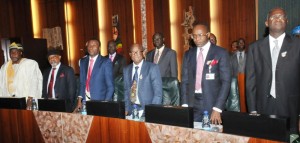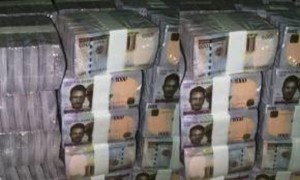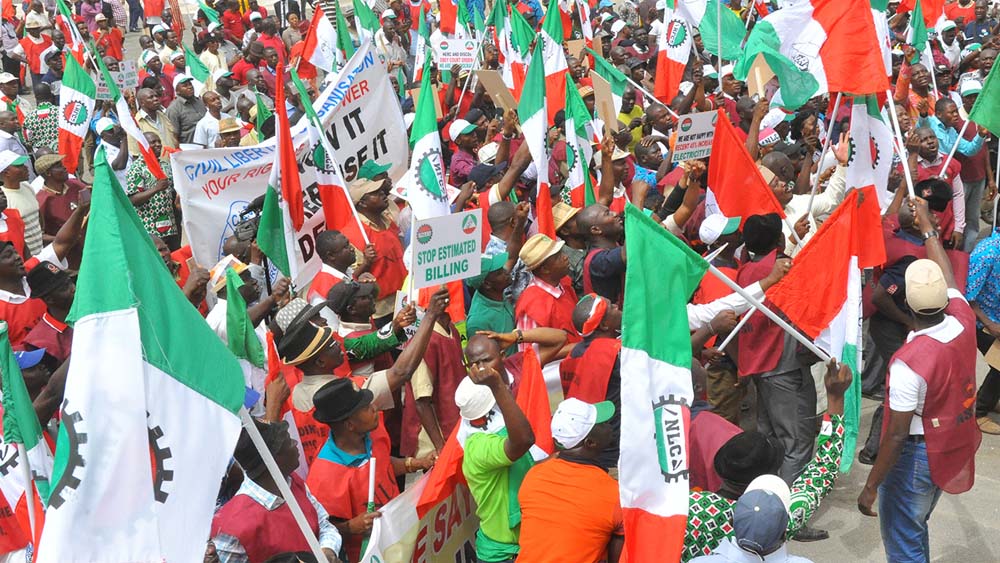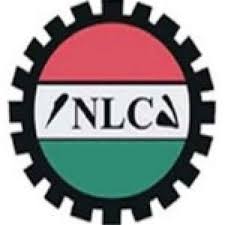Finance
2016: Nigeria benchmarks crude on $38 per barrel,approves N6tn budget

By Yemie ADEOYE
ABUJA-NIGERIA’s Federal Executive Council presided over by President Muhammadu Buhari on Monday approved the nation’s Medium Term Expenditure Framework in preparation for the presentation of the 2016 budget.
The framework sets up government’s economic plans for the next three years. The Minister of Budget and National Planning, Senator Udo Udoma, explained this to State House correspondents at the end of the council’s emergency meeting also attended by Vice President Yemi Osinbajo.
Udoma was joined at the briefing by the Minister of Information and Culture, Lai Mohammed; and the Minister of State for Budget and National Planning, Zaynab Ahmed.
Giving some of the highlights of the approved MTEF, Udoma said the council agreed on $38 per barrel of oil as benchmark price for the budget, a figure he said the council considered to be very conservative.
He also said that the council also agreed to peg the production of crude oil at 2.2 million barrels per day for next year.
Udoma said after the approved MTEF would have been submitted to the National Assembly, the preparation of the 2016 budget would be finalised.
He, however, gave a hint that the 2016 budget would be around N6tn, about N1tn more than the current budget.
The minister said the increase in the budget figure would be devoted to capital expenditure.
Udoma said, “At today’s meeting, the Council approved the Medium Term Economic Framework, which sets out the policies of government over the next three years. It sets out the fundamental economic underpinning of the budget.
“The highlights are as follows: we project and we are working with $38 per barrel crude oil price. We consider that to be very conservative but because of the uncertainty, we felt that we should start with a conservative crude oil price.
“We are also working with 2.2 million barrels a day production, saying it is achievable, particularly with the passage of the Petroleum Industry Bill, which we are working to achieve. We believe that that is a modest figure and that we should be able to produce something higher than that.”
The minister explained further, “And so next year, we are looking at an expansionist budget. We are looking at a budget that will be N1 trillion more than last budget. So, we are looking at a budget of about N6 trillion.
“This year’s budget, including the supplementary, was about N5tn. So, we are looking at a N6 trillion budget. All the increases actually will be spent on capital projects, because there is the need to increase the capital expenditure because of the infrastructure issues that we have to address.
“Following from this, the MTEF will be submitted to the National Assembly and we expect a feedback from them; thereafter, we will be working to try and get the budget finalised. It is when the budget is finalised that you will really see the details of what we intend to do. This is just a medium term economic framework.”
When asked how the Federal Government intended to fund next year’s budget, Udoma said the government would increase non-oil revenue from its agencies and keep down the recurrent expenditure.
He added that the government would ensure efficiency from revenue generating agencies like the Federal Inland Revenue Service, especially in terms of company income taxes.
Udoma added that at the end, the balance would be sourced through borrowing and explained that the government desired a prudent and credible budget and was, therefore, projecting 30 per cent of the budget for capital expenditure.
He said, “We will get the funding from two sources. We are looking at trying to increasing our non-oil revenue and we are looking at trying to get more money from the various government agencies by policing their collection and trying to get more money from them.
Business
Nigeria pays US$4.9 billion on petrol subsidy in 2024- NNPCL
It was however noted by Biztellers.com.ng, that although subsidy is back in effect, the main reason for that is the increasingly weak state of the Naira and the country’s extreme dependence on products importation. Also unlike the previous subsidy era, where several oil marketers were getting free subsidy refunds for unverified product importation, this subsidy era is witnessing only one importer, the NNPCL, which in effect is the sole receiver of government subsidies.
Yemie ADEOYE
INSPITE of the official position of the Nigerian government that the controversial petrol subsidy is gone for good as announced by the President on assumption of office, the state owned Nigerian National Petroleum Corporation Limited, NNPCL has disclosed that petrol subsidy is still fully operational in Nigeria, although, under a different identity.
Umar Ajiya, Chief Financial Officer at the NNPCL, disclosed that it cost the company a staggering N7.8 trillion (US$4.9) to cover this price gap in the first seven months of 2024.
Rather than simply referring to these claims as subsidies, he stated that the company is merely managing the price difference in petrol imports on behalf of the federation, stressing that this should not be misconstrued as a return to subsidy payments.
![]() This revelation has reignited discussions on whether the NNPC is indirectly offering subsidies, a concept typically defined as selling a product below its cost price.
This revelation has reignited discussions on whether the NNPC is indirectly offering subsidies, a concept typically defined as selling a product below its cost price.
Documents reviewed by Biztellers.com.ng showed that the term “subsidy” was used extensively in official correspondence between the NNPCL and the presidency, particularly in reference to the “shortfall.”
Recall that President Bola Tinubu reportedly approved NNPC’s request to utilize the 2023 final dividends due to the federation to offset these costs.
However, during a media briefing on Monday about the company’s 2023 audited financial statements, Ajiya refuted claims that the NNPC is involved in any subsidy scheme.
Ajiya further disclosed that the Nigerian government owes the NNPC N7.8 trillion ($4.9 billion) in subsidy-related debts for the period from January to July 2024.
In furtherance of his clarification to the News Agency of Nigeria (NAN), Ajiya insisted that no subsidy payments have been made to any marketer in the last nine years, citing the NNPC’s role as the sole importer of petrol under supply contracts.
He said, “In the last eight to nine years, NNPC Ltd. has not paid anyone a dime as a subsidy; no kobo has been disbursed by NNPC Ltd. in the name of subsidy. No marketer has received any payment from us for subsidy.”
“What has been happening is that we have been importing PMS, which has been landing at a specific cost price, and the government tells us to sell it at half price. So the difference between the landing price and that half price is a shortfall.
“And the deal is between the Federation and NNPC Ltd., to reconcile, sometimes they give us money, so there is no money exchanging hands with any marketer in the name of subsidy.”
Ajiya remained silent on how much of the $4.9 billion could have been remitted to the federation account if the NNPC had not been covering the “shortfall.”
It was however noted by Biztellers.com.ng, that although subsidy is back in effect, the main reason for that is the increasingly weak state of the Naira and the country’s extreme dependence on products importation. Also unlike the previous subsidy era, where several oil marketers were getting free subsidy refunds for unverified product importation, this subsidy era is witnessing only one importer, the NNPCL, which in effect is the sole receiver of government subsidies.
Banking
CBN Denies Currency Devaluation

The Central Bank of Nigeria (CBN) has refuted claims of devaluing the.
Earlier reports suggested that the CBN had devalued the Naira, lowering its exchange rate from N631 to the dollar, compared to the previous day’s rate of N461.60 at the Importers and Exporters (I&E) window.
However, the Central Bank of Nigeria (CBN) released a statement on Thursday through its Acting Head of Corporate Communications, Dr. Isa Abdulmumin, categorizing the report as false information.
In the statement titled ‘CBN Has Not Devalued The Naira’, he said the attention of the apex bank was drawn to the news report by an Abuja based newspaper edition of June 1, 2023, titled “CB Devalues Naira To 630/51”.
However, the CBN stated categorically that the news report was replete with outright FALSEHOODS and destabilizing innuendos, ‘reflecting potentially willful ignorance of the said medium as to the workings of the Nigerian Foreign Exchange Market.’
“For the avoidance of doubt, the exchange rate at the Investors’ & Exporters (I&E) window traded this morning (June 1, 2023) at N465/USS1 and has been stable around this rate for a while.
“The public is hereby advised to ignore the news report by Daily Trust in its entirety, as it is speculative and calculated at causing panic in the market,” the CBN spokesman added.
He, therefore, advised media practitioners to verify their facts from the Central Bank of Nigeria before publishing in order not to misinform the public.
Banking
BREAKING: CBN Increases Interest Rate By 0.5%

The interest rate in Nigeria has been raised to 18.5 percent, up by 0.5 percent, from 18 percent where it was pegged in March 2023.
The Central Banks of Nigeria’s (CBN) Monetary Policy Committee (MPC) resolved to this effect at its third meeting of 2023 in Abuja, on Wednesday.
Governor, CBN, Godwin Emefiele, made the disclosure in the communiqué of the MPC’s meeting, thereafter.
While engaging the media at the end of the two-day meeting, Emefiele, said the committee voted to keep the asymmetric corridor at +100 and -700 basis points around the MPR.
In the view of the MPC, rising inflation rate is traceable to the high energy cost and challenges around the supply chain, among others, which lie outside the corridors of the CBN.
Emefiele said, “The current trend in price development would continue to be monitored by the bank with greater collaboration with fiscal authority to address the drivers of inflation.”
Biztellers reports that the CBN had effected six consecutive interest rate increases, which has seen the rate move from 11.5 percent in March 2022 to 18.5 percent in May 2023.

























